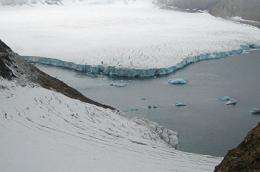Feeling warm makes people more likely to believe in global warming, study finds

(PhysOrg.com) -- Being in a warm room can make the idea of global warming seem more likely, according to researchers from the University of Chicago Booth School of Business and the Haas School of Business at University of California, Berkeley.
A new study finds that when people feel warmer—either because they are out in the hot sun or because they are in an overheated room—they believe in global warming more. The findings were published online Jan. 20 in the Journal of Personality and Social Psychology.
“What makes a future event feel more real is not necessarily well–conducted research that speaks to the event’s likelihood, but factors that enable us to picture what that future event would look like,” said Jane Risen, an assistant professor of behavioral science at Chicago Booth and one of the authors of the study. The other author is Clayton Critcher, an assistant professor of marketing at Haas.
Participants in one study who were asked to answer a questionnaire outdoors were more likely to report that global warming is a proven fact the higher the outdoor temperature. To confirm that the feeling of warmth swayed participants’ views, rather than the hot weather itself as evidence of a warming planet, the researchers conducted the same experiment indoors.
They found that participants answering the questionnaire in a heated cubicle were more likely to believe in global warming, suggesting that it was the experience of heat, not the information that it conveyed, that impacted people’s beliefs.
Risen and Critcher then tested the idea that feeling warm allows people to form a sharper image in their minds of a world becoming hotter, which in turn intensifies people’s beliefs in global warming.
Participants in one experiment indicated the sharpness or dullness with which they were imagining hot arid landscapes by adjusting the clarity of photos. Those in a heated cubicle made the images of hot and arid landscapes look much sharper than those who were in a room–temperature cubicle. Moreover, showing people clearer (versus more distorted) images of these same hot landscapes led them to believe in global warming more. In combination, this suggests that while feeling warm, people have a sharper mental image of what a hot world would be like, and they are more likely to believe in global warming.
These results are neither unique to the experience of feeling warm nor to the issue of global warming. In another experiment, the researchers found that participants who were led to experience thirst by eating pretzels were more likely to agree that desertification and drought increasingly threaten people’s ability to find fresh drinking water. This further validates the finding that people will judge a certain condition of the world as more likely if it fits with what they are experiencing at that moment.
More information: www.apa.org/pubs/journals/psp/
Provided by University of Chicago

















